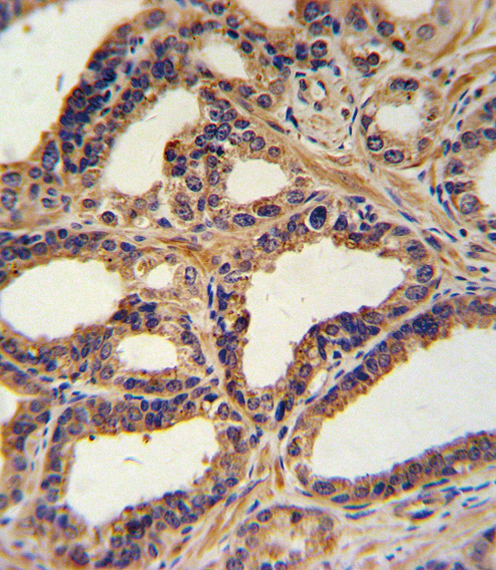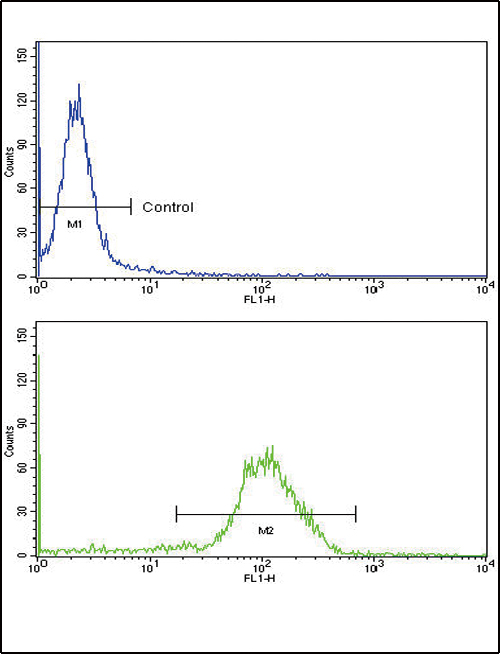NPPA Antibody (N-term)
Affinity Purified Rabbit Polyclonal Antibody (Pab)
- 产品详情
- 文献引用 : 6
- 实验流程
- 背景知识
Application
| IHC-P, WB, FC, E |
|---|---|
| Primary Accession | P01160 |
| Reactivity | Human, Rat, Mouse |
| Host | Rabbit |
| Clonality | Polyclonal |
| Isotype | Rabbit IgG |
| Calculated MW | 16396 Da |
| Antigen Region | 30-56 aa |
| Gene ID | 4878 |
|---|---|
| Other Names | Natriuretic peptides A, CDD-ANF, Prepronatriodilatin, Cardiodilatin-related peptide, CDP, Atrial natriuretic factor, ANF, Atrial natriuretic peptide, ANP, NPPA, ANP, PND |
| Target/Specificity | This NPPA antibody is generated from rabbits immunized with a KLH conjugated synthetic peptide between 30-56 amino acids from the N-terminal region of human NPPA. |
| Dilution | IHC-P~~1:100~500 WB~~1:1000 FC~~1:10~50 E~~Use at an assay dependent concentration. |
| Format | Purified polyclonal antibody supplied in PBS with 0.09% (W/V) sodium azide. This antibody is purified through a protein A column, followed by peptide affinity purification. |
| Storage | Maintain refrigerated at 2-8°C for up to 2 weeks. For long term storage store at -20°C in small aliquots to prevent freeze-thaw cycles. |
| Precautions | NPPA Antibody (N-term) is for research use only and not for use in diagnostic or therapeutic procedures. |
| Name | NPPA |
|---|---|
| Synonyms | ANP, PND |
| Function | [Atrial natriuretic peptide]: Hormone that plays a key role in mediating cardio-renal homeostasis, and is involved in vascular remodeling and regulating energy metabolism (PubMed:15741263, PubMed:16875975, PubMed:18835931, PubMed:21672517, PubMed:22307324, PubMed:2532366, PubMed:2825692, PubMed:7595132, PubMed:7720651, PubMed:8087923, PubMed:8653797). Acts by specifically binding and stimulating NPR1 to produce cGMP, which in turn activates effector proteins, such as PRKG1, that drive various biological responses (PubMed:1660465, PubMed:1672777, PubMed:21098034, PubMed:2162527, PubMed:22307324, PubMed:25401746, PubMed:2825692, PubMed:7720651, PubMed:8384600, PubMed:9893117). Regulates vasodilation, natriuresis, diuresis and aldosterone synthesis and is therefore essential for regulating blood pressure, controlling the extracellular fluid volume and maintaining the fluid-electrolyte balance (PubMed:2532366, PubMed:2825692, PubMed:7595132, PubMed:7720651, PubMed:8087923, PubMed:8653797). Also involved in inhibiting cardiac remodeling and cardiac hypertrophy by inducing cardiomyocyte apoptosis and attenuating the growth of cardiomyocytes and fibroblasts (PubMed:16875975). Plays a role in female pregnancy by promoting trophoblast invasion and spiral artery remodeling in uterus, and thus prevents pregnancy-induced hypertension (By similarity). In adipose tissue, acts in various cGMP- and PKG-dependent pathways to regulate lipid metabolism and energy homeostasis (PubMed:15741263, PubMed:18835931, PubMed:21672517, PubMed:22307324). This includes up-regulating lipid metabolism and mitochondrial oxygen utilization by activating the AMP-activated protein kinase (AMPK), and increasing energy expenditure by acting via MAPK11 to promote the UCP1-dependent thermogenesis of brown adipose tissue (PubMed:15741263, PubMed:18835931, PubMed:21672517, PubMed:22307324). Binds the clearance receptor NPR3 which removes the hormone from circulation (PubMed:1672777). |
| Cellular Location | [Long-acting natriuretic peptide]: Secreted. Note=Detected in blood. [Kaliuretic peptide]: Secreted. Note=Detected in blood [Atrial natriuretic peptide]: Secreted. Perikaryon. Cell projection. Note=Detected in blood (PubMed:15741263, PubMed:18835931, PubMed:2532366, PubMed:7955907, PubMed:7984506, PubMed:8351194, PubMed:8653797, PubMed:8779891). Detected in urine in one study (PubMed:8351194). However, in another study, was not detected in urine (PubMed:7984506). Detected in cytoplasmic bodies and neuronal processes of pyramidal neurons (layers II-VI) (PubMed:30534047) Increased secretion in response to the vasopressin AVP (By similarity) Likely to be secreted in response to an increase in atrial pressure or atrial stretch (PubMed:2532366). In kidney cells, secretion increases in response to activated guanylyl cyclases and increased intracellular cAMP levels (PubMed:9893117). Plasma levels increase 15 minutes after a high-salt meal, and decrease back to normal plasma levels 1 hr later (PubMed:8779891). {ECO:0000250|UniProtKB:P01161, ECO:0000269|PubMed:15741263, ECO:0000269|PubMed:18835931, ECO:0000269|PubMed:2532366, ECO:0000269|PubMed:30534047, ECO:0000269|PubMed:7955907, ECO:0000269|PubMed:7984506, ECO:0000269|PubMed:8351194, ECO:0000269|PubMed:8653797, ECO:0000269|PubMed:8779891, ECO:0000269|PubMed:9893117} |
| Tissue Location | [Urodilatin]: Detected in the kidney distal tubular cells (at protein level) (PubMed:8384600, PubMed:9794555). Present in urine (at protein level) (PubMed:2972874, PubMed:8351194, PubMed:8779891, PubMed:9794555). |
For Research Use Only. Not For Use In Diagnostic Procedures.

Provided below are standard protocols that you may find useful for product applications.
BACKGROUND
NPPA belongs to the natriuretic peptide family. Natriuretic peptides are implicated in the control of extracellular fluid volume and electrolyte homeostasis. This protein is synthesized as a large precursor(containing a signal peptide), which is processed to release a peptide from the N-terminus with similarity to vasoactive peptide, cardiodilatin, and another peptide from the C-terminus with natriuretic-diuretic activity.
REFERENCES
Watanabe,Y., et.al., Biochem. Mol. Med. 61 (1), 47-51 (1997)
Suga,S., et.al., Endocrinology 130 (1), 229-239 (1992)
终于等到您。ABCEPTA(百远生物)抗体产品。
点击下方“我要评价 ”按钮提交您的反馈信息,您的反馈和评价是我们最宝贵的财富之一,
我们将在1-3个工作日内处理您的反馈信息。
如有疑问,联系:0512-88856768 tech-china@abcepta.com.






















 癌症的基本特征包括细胞增殖、血管生成、迁移、凋亡逃避机制和细胞永生等。找到癌症发生过程中这些通路的关键标记物和对应的抗体用于检测至关重要。
癌症的基本特征包括细胞增殖、血管生成、迁移、凋亡逃避机制和细胞永生等。找到癌症发生过程中这些通路的关键标记物和对应的抗体用于检测至关重要。 为您推荐一个泛素化位点预测神器——泛素化分析工具,可以为您的蛋白的泛素化位点作出预测和评分。
为您推荐一个泛素化位点预测神器——泛素化分析工具,可以为您的蛋白的泛素化位点作出预测和评分。 细胞自噬受体图形绘图工具为你的蛋白的细胞受体结合位点作出预测和评分,识别结合到自噬通路中的蛋白是非常重要的,便于让我们理解自噬在正常生理、病理过程中的作用,如发育、细胞分化、神经退化性疾病、压力条件下、感染和癌症。
细胞自噬受体图形绘图工具为你的蛋白的细胞受体结合位点作出预测和评分,识别结合到自噬通路中的蛋白是非常重要的,便于让我们理解自噬在正常生理、病理过程中的作用,如发育、细胞分化、神经退化性疾病、压力条件下、感染和癌症。








